There is no land beyond the Rhine. The First Failures of the Great Army in 1814
Crossing, still crossing
Field Marshal Blucher, crossing his Silesian army across the Rhine, actually pulled the allied forces into France. But many were beyond the Rhine even before the Prussians. However, they didn’t have to fight again right away - the opponents chose to take a break in the winter apartments.
Alexander I “didn’t even want to dwell on the Rhine for a long time, but go straight to Paris in the winter, but our allies seemed to be stunned at the sight of the borders of France, probably from their unsuccessful attempts in the previous wars. So wrote about the beginning of the company 1814 of the year, its participant - historian A.I. Mikhailovsky-Danilevsky. The union rate, in which Alexander I again gathered all the monarchs by the beginning of spring (very early in France), was located in Langres.
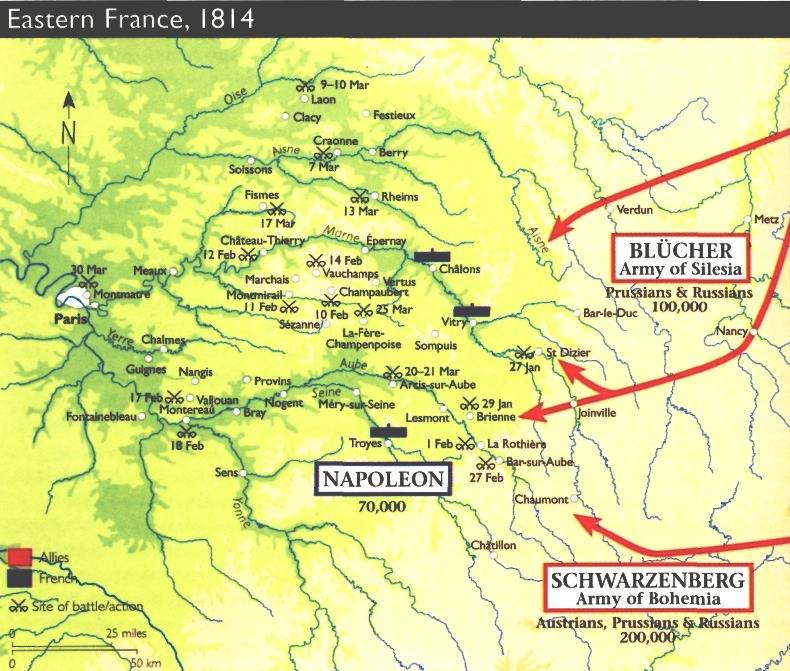
But military action was opened by an impatient French emperor, for whom the winter invasion was by no means a surprise. Napoleon went to the army from Paris, and he left the military leadership in the capital not to some of the marshals, but to his brother Joseph, for whom the route to Spain seems to have already been ordered. Towards evening in the evening of January 26, the emperor arrived in Chalon-sur-Marne, in his next main apartment.
Napoleon had at his disposal no more than 70 thousand against almost 200-thousandth forces of the allies. All his calculations were connected with the fact that Schwarzenberg and Blucher constantly had to share their forces not only for full satisfaction, but also for the protection of communications and the blockade of numerous fortresses. In addition, the Swedish Crown Prince Bernadotte at the head of the Northern Army was not at all eager to fight on his native land.
For the umpteenth time, Napoleon gained the opportunity to act on internal operational lines, collecting maximum forces against individual parts of the allied armies. Between Chalon and Vitry-le-Francois at this time the center of the French army was concentrated, which, out of habit, was still called the Great. These were the corps of Marshals Ney, Victor and Marmont, each by force no more than the old division, as well as the few cavalry of Pear.
The emperor decided to pull the left wing of Marshal MacDonald from Mezieres to Chalon - through Rethel, and the right wing, which was the guard under the command of Marshal Mortier, moved to Troyes, blocking another direct road to Paris. To the right of the guard, on the banks of the Ionne in Oxerre, there remained only the detachment of General Alix.
Napoleon decided not to delay the offensive, giving all the necessary orders. Removing from the winter apartments, his forces had to unite at Vitry, and from there through Saint-Dizier and Joinville move to Chaumont. Thus, having become between the main (former Bohemian) and Silesian armies of the allies, the French could strike at the head columns of one or another army and break up their disparate corps.
Emperor Marshal Augereau set the task of driving the Allies away from Lyon, then acting on the rear of the army of Schwarzenberg. Apart from the main forces, only the regiments of General Meson remained, who were to defend the northern borders of France in the event of the invasion of another allied army under the command of Bernadotte. The fact that Bernadotte divided his army by sending Russian and Prussian corps to clear the Netherlands of the French garrisons, and himself with his Swedes moved to Denmark, it became known much later.
Not only advancing. We win
Napoleon remained in Chalon for only 12 hours, and went through Vitry to Saint-Dizier, having expelled from there the detachment of General Lansky, which Blucher left for contact with York. On French soil, the emperor immediately became much better off with intelligence. It was she who reported that the positions of the Main Army around Langre were very scattered, and Blucher, for the most part of the forces of his army, made a move to Brienne, trying to get around the French.
Napoleon immediately sent to Troyes the order of Mortier to join his right flank, and marched behind the Silesian army. In the battle of Brienne, the French almost defeated Blucher's troops even when crossing Ob. The salvation for the Russian and Prussian troops was actually intercepted by the Cossacks order of the emperor to Marshal Mortier, after which the Silesian army managed to gather almost all its forces against Napoleon.
Having concentrated his corps, Blucher was ready to immediately retreat to Trann and Bar-sur-Ob, so as not to break away from the main army of Schwarzenberg. But Napoleon already attacked the lines of Russians and Prussians, despite the fact that the vanguard of Count Palen from the Wittgenstein corps strengthened the Silesian army. There was no extreme bitterness near Brienne, but the battle continued until late at night; not only General Saken and Field Marshal Blucher were almost captured, but Napoleon himself, who had twice crossed the line of fire.
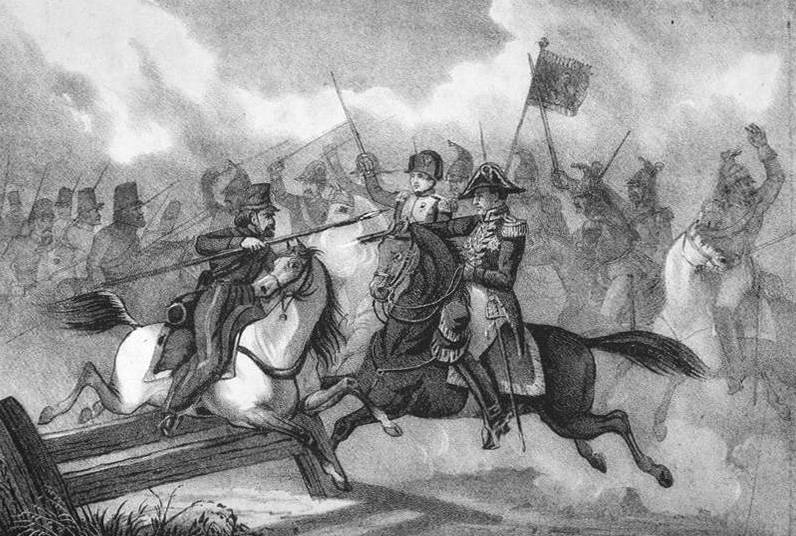
The retreat of the Russians and the Prussians to Trann allowed the French emperor to declare the first victory in the company. The relative failure of Brienne forced the Allies to concentrate their main forces on Bar-sur-0, and several divisions from the Main Army managed to join Blucher in convenient positions at Tran.
Napoleon did not pursue the Silesian army, but stopped at La Rotiere, as he received incorrect information about the nomination of Schwarzenberg to Oxerre. It was at the positions near La Rottiere that the French were attacked by Blucher, who managed to concentrate more than 100 thousand people for a decisive battle. The Prussian field marshal was impatient to take revenge for Brienne, although he knew that the decisive battle was still a long way off.
The seriousness of the allied command’s attitude was evidenced even by the fact that Alexander I and the Prussian King Friedrich Wilhelm with a few retinues had arrived in Tran by that time. They immediately jumped in from the positions of Schwarzenberg and Barclay de Tolly, however, the command in the battle remained with the Prussian field marshal.
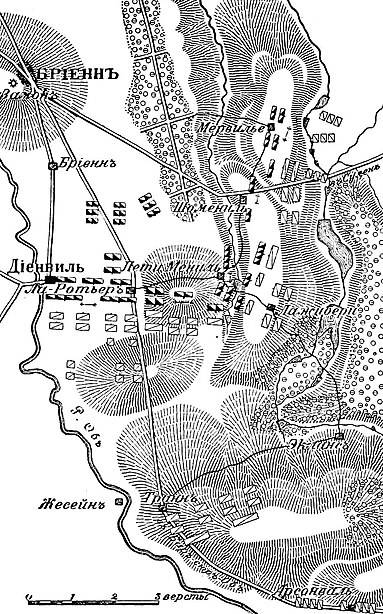
The Allies won the victory only after the Wrede Bavarian Corps came to help them. All night after the battle, the French had to retreat along the Ob and Vuara rivers along two narrow roads. The strong rearguards that Napoleon left at the crossings retreated with the dawn of February 2, but even the Main Army did not succeed in much pursuit due to heavy snowfall.
Which road leads to Paris?
The Napoleonic troops in the 1814 campaign of the year will only later become distinguished by rare swiftness, and in this case they had to retreat even from Brienne. After the French left, three monarchs gathered in the Brienne castle in the evening of February 2 - the Austrian emperor Franz urgently arrived from Vienna and all the commanders except Bernadotte were with them.
In order to ensure an irreversible march to Paris, it was necessary to once again separate the forces because of difficulties with supply, and especially with foraging. The thousands of Cossack cavalry had a good appetite, and without it, the allied forces could be simply blind in enemy territory.
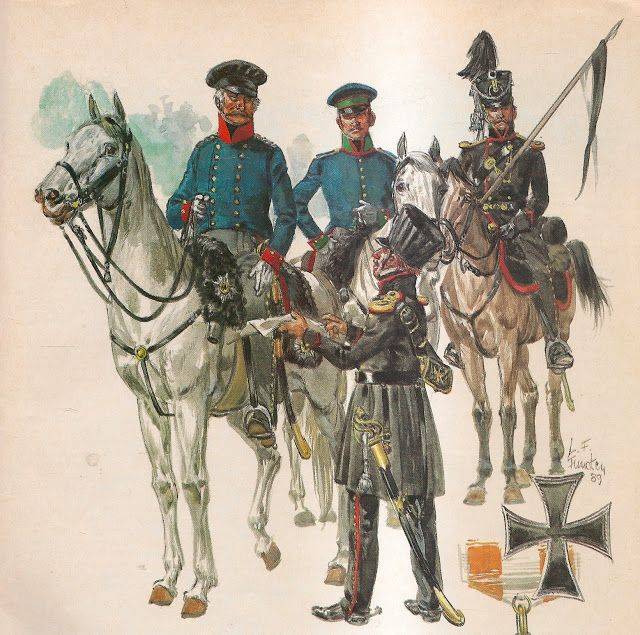
The Silesian army was sent to Chalon to join the corps of Langeron, York and Kleist, and it was to advance along the Marne through Mo directly to Paris. For the Main Army, a path to the French capital on both banks of the Seine was planned. The agreed offensive began when the Allies lost Napoleon’s army for two days.
Only on 5 of February did the report of Count Ozharovsky arrive in the main apartment that Marshal Marmont pulled his corps to Arsi-sur-Aub, and Napoleon with the main forces went first to Troyes, and then moved in the direction of Nozhan. Schwarzenberg did not believe this and advanced to Troyes with extreme caution, preferring to keep his forces as compact as possible.
When it turned out that even the French rearguard withdrew from this town without a fight, the Allied main apartment quickly moved to Troyes. Here the allied command found a message about the start of peace talks in Chatillon. Kolenkur, who replaced Talleyrand there, expertly bargained for the immediate condition for an armistice to return France to the borders of the 1792 of the year. The first to reject him was Emperor Alexander I.
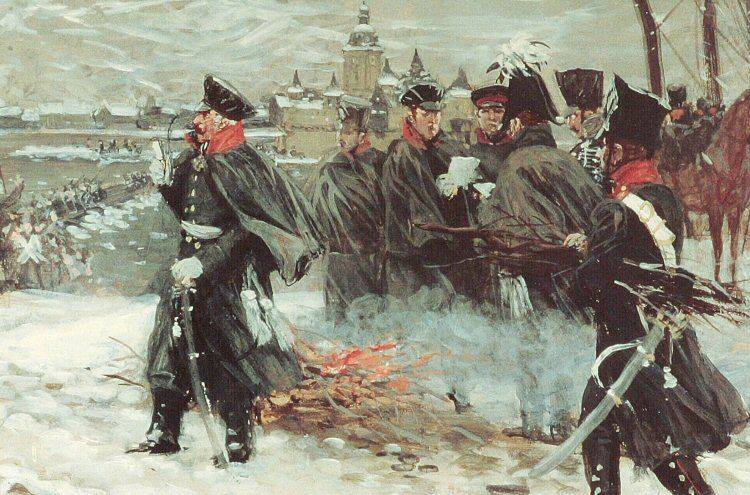
Against the French at that time, even Blucher with the Silesian Army was not very active, and only corps — the Russian Wittgenstein and the Bavarian Wrede — pursued Napoleon. The operations of the Cossacks of Platov, the detachments of Seslavin, Dibich and Lubomirsky did not prevent Napoleon from quietly waiting in Spain for the old regiments and even from afar to lead the preparation of the 170-thousandth replenishment from the new draft.
The opponents ended the first ten days of February in the following position: Schwarzenberg’s main army, with a force of more than 150 thousand people, was slowly pulling up from the positions of Troyes to the ferries on the Seine, Bluchner’s 70-thousandth Silesian army, breaking up into several mobile units, began to operate in the direction of Paris, while as 100 of thousands of Frenchmen under the command of Napoleon did not budge at Nozane. Only Marshal MacDonald led the main park in the direction of Moe in case of need to collect it near the walls of Paris.
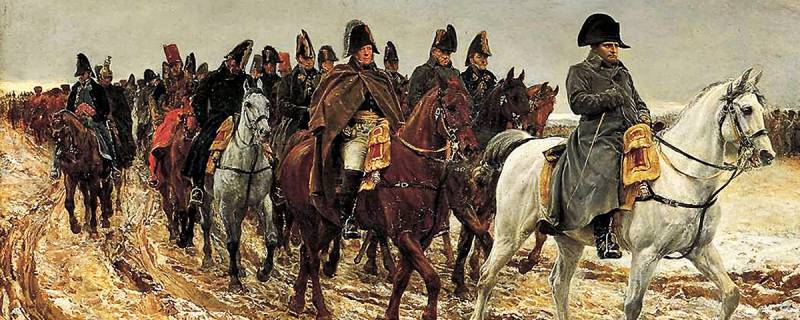
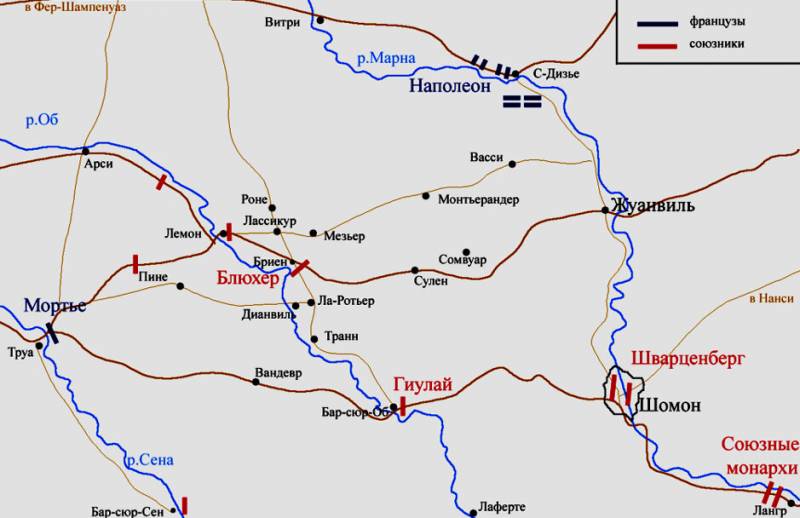
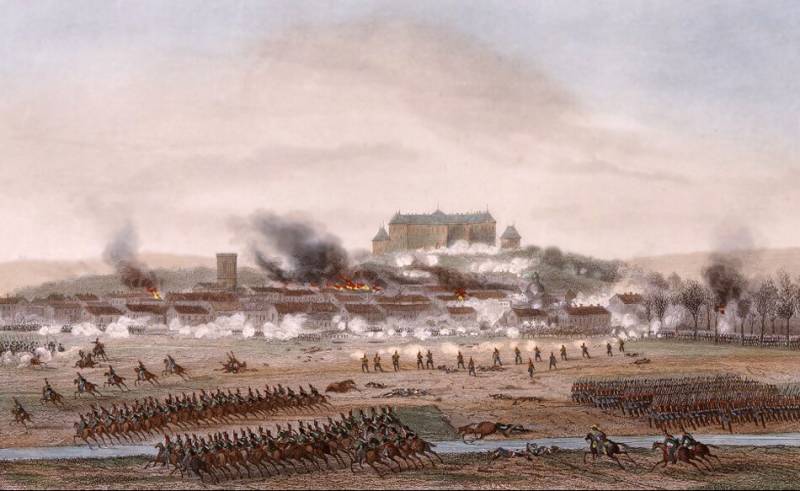
Information